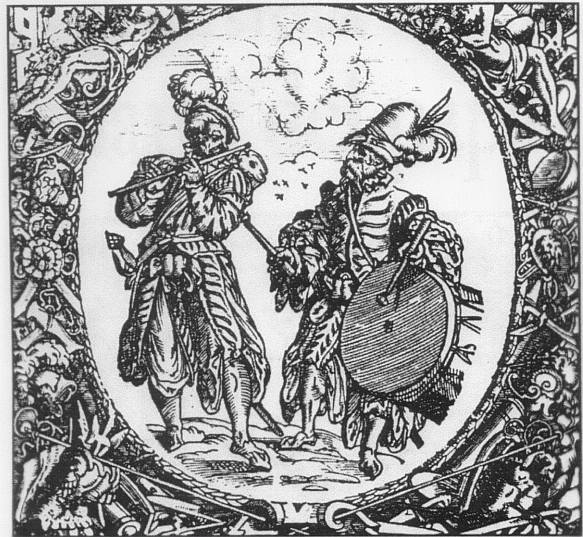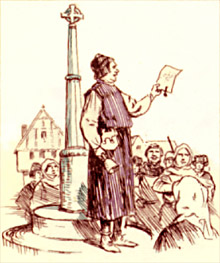It has long been said that how we treat our dead is what separates humanity from the beasts. As a Fantasy author, I suppose I need to extend that a little bit. All of the traditional Fantasy peoples seem to share this need to treat their dead with some kind of ritual. Perhaps it is because Fantasy creatures are all simply extensions of the human experience which allows us to investigate our psyche in an abstract form, perhaps there is some connection between higher cognitive processes and the fear of death, or maybe some of us writers just aren't all that creative. Hey, this is my head, you can get out at any time. Be thankful. Anyway, whatever the root of all this pomp and circumstance, creatures die and those that remain need to stash the bodies.

Pondering mortality may very well be what caused the birth of religion. Once you understand that we will all die one day, it's hard to feel like what we accomplish on this planet means anything. We want some reward at the end for all of the hard work that we go through, or at least some sort of meaning to existence beyond propagating the species. Barring that, we'd like our problems to be someone else's fault. If the fear of death caused the birth of religion, then it's only natural that the transition into that great beyond be dealt with in a ritualistic manner (whatever that might entail). Humanity has certainly evolved a wide variety of practiced to ease that transition, ostensibly for the dead, but for the living as well.
Preparation
So you've got the corpse of a loved one, what do you do with it? Whatever you're going to do, you need to act quickly. While a funeral is a method of coming to terms with death and sending an individual into the afterlife in some style, you don't want the side-effects of decay to play a starring role (see: funeral for a certain Lannister). Jewish tradition still encourages acting quickly following a passing, even with modern embalming methods.
Bodies are often ritually cleansed, either by the family or by professional hands. Then they are dressed for burial, often in their finest clothes or the trappings of their profession (though some cultures/religions opt for a simple winding sheet, or ritual raiment). The garb of the deceased seems to be more influenced by whether their religion suggests that they can "take it with them" than by the method of disposal. Famously, the Egyptian pharaohs were interred with fabulous riches, as well as helpers and animals (or at least statues of them). The ancient Greeks put coins over the eyes of the dead to pay the ferryman for their passage in the netherworld. Some Native American tribes left food for the deceased, while the Nez Perce sacrificed wives, slaves and horses to join a dead warrior in the afterlife. The Chinese emperor, Qin Shi Huang, famously constructed his mausoleum to house an army of terracotta soldiers and chariots. However, many traditions prefer the simpler angle. The Jewish people bury their dead in plain white garments to show that their actions are what their God judges them by, not their wealth.
Finally, the bodies are posed, usually eyes and mouths closed, some with hands clasped over the chest, others in the fetal position (it varies widely). In the Pacific Northwest, one tribe would use clubs to break the bones of their greatest warriors so that they could be fitt in little boxes and hung as totems of protection for the village. As we say, practices vary.
Disposal
As ugly a reality as it may be, something has to be done with the corpse. You can't just leave it where it expires, to stink up the place. It needs to be disposed of in some fashion. Even when people were dying by the bushel during the Black Death (insert spooky music) and the corpse carts were rolling down the streets, people did their best to inter the bodies, even if that meant being dumped in mass graves, or burning the houses with the afflicted still inside. There really are very few ways to dispose of a corpse with "dignity".
The two primary methods of disposal are burial and burning. How and why you go about this where it gets interesting. The Apache buried the body and burned the deceased's goods as quickly as possible to keep the spirits away (as the dead apparently resent the living). Burials might have been in graves, caves, tree platforms, cairns, mounds, or an infinite variety of tombs and mausoleums. The Urnfield Culture (1300-750 BC), which stretched from western Hungary to eastern France, apparently wanted the best of both worlds, cremating their dead and then burying the ashes in pottery vessels. Shinto followers bury some of the ashes and keep the rest in smaller in-home shrines. In some cultures, they'd accumulate a fair number of bodies before incinerating the lot together in a grand ceremony.
There are outliers to these basic practices. Tibetan and Mongol peoples traditionally exposed corpses (Sky Burial and Air Sacrifice respectively) to be devoured by animals, as a returning of the body to nature (be careful in your research, video gets pretty graphic pretty quickly for the Sky Burial, though not included in the notes below). The Maasai Tribe does the same since they apparently don't believe in an afterlife, except for chieftains, who get buried. There are plenty more, I'm sure, but it's a beautiful day outside and this is getting depressing.
Ceremony
This is the section about what those left behind do. Mourning periods of various duration are extremely common. The wearing of black is, obviously, a ritual in many traditions. Some widows wear only black for the remainder of their lives. Ritual markings, whether through paint or scarring mark some Native American traditions. Irish "keening" for the dead consisted of crying, wailing, and reading poetry lamenting the loss of a loved one. The Irish stopped clocks to show how time was unimportant in such times and also covered mirrors in black draperies, since it was thought that the dead might look in through them. Shinto tradition has mourners turn the regular items of life (like shoji screens) literally upside-down. Stories of the dead are often shared by mourners. Family and friends will often bring gifts of food, not to mention cash, to lighten the immediate family's load in their time of trouble. Drinking, quite naturally, takes its place in many of these traditions as well. Hell, we haven't even gotten to the religious rituals associated.
Funerals are most commonly presided over by a religious figure (we discussed their importance before, right). However, captains of ships, other military leaders, even a stranger passing by will do in a pinch. This is where the words of consolation are traditionally spoken, wishing clemency for the deceased and consolation for the bereaved. Mourners usually turn out in their finest outfits and may bring flowers or tokens connected to the deceased to place on the grave or pyre. Flowers and incense often play a role here. As ever, music tends to play a role where people have difficulty expressing themselves. We turn to traditional tunes to connect us to the deceased and all who have gone before. I always find the ceremonial shovelful of earth for the mourners to be especially morbid (does that mean that I helped to put him/her in the ground?), but it seems to be common enough.
Many cultures mark the individual graves of their loved ones with tombstones or other markers. This seems natural enough when the Shinto engage in ancestor worship, but seems a little odder for the rest of us. We've all seen the vast memorials that "great", or at least rich people build for themselves. Still today, many people will tidy the graves of their ancestors on All Saints Day. Others will visit on the anniversary of their loved one's passing, or birthday. Jews often mark the visiting of a grave by placing a small rock on the headstone. Others will leave gifts to the spirits, as their religion suggests. Apparently the Vietnamese will leave thick wads of counterfeit currency at the monument so that the deceased can buy whatever they need in the afterlife.
Doing a bit of digging (sorry, sorry) has really got me thinking about how the population of my world treats their dead. It's simple enough to take bits and pieces of tradition and mash them together, but it's another thing entirely to assemble an honest rational of why. Do your peoples have religion? What do they expect from their religion? If they actually can have conversations with their gods, how does that change things? Will there be misinterpretations of what their gods want? How does the reality of their surroundings impact their customs and traditions? Do those customs and traditions conflict with any of their neighbors' (like we outlawed some Native American traditions, or the Chinese outlawed the Tibetan)? Damn, there is a lot of work to do ;) I hope you enjoy it as much as I do.
Sources (besides my own skull)
Jewish Tradition - http://jewish-funeral-home.com/Jewish-burial-customs.html#_Toc68663324
Native American - http://www.deathreference.com/Me-Nu/Native-American-Religion.html
Terracotta Army - http://www.travelchinaguide.com/attraction/shaanxi/xian/terra_cotta_army/
Urnfield Culture - https://en.wikipedia.org/wiki/Urnfield_culture
Shinto Tradition - http://www.worldclass.net/TeachingGlobally/WorldReligions/shinto_funerals.htm
Sky Burial - https://en.wikipedia.org/wiki/Sky_burial
Other interesting Traditions - http://matadornetwork.com/bnt/10-extraordinary-burial-ceremonies-from-around-the-world/
Irish Traditions - https://www.funeralwise.com/customs/irishwake/
















